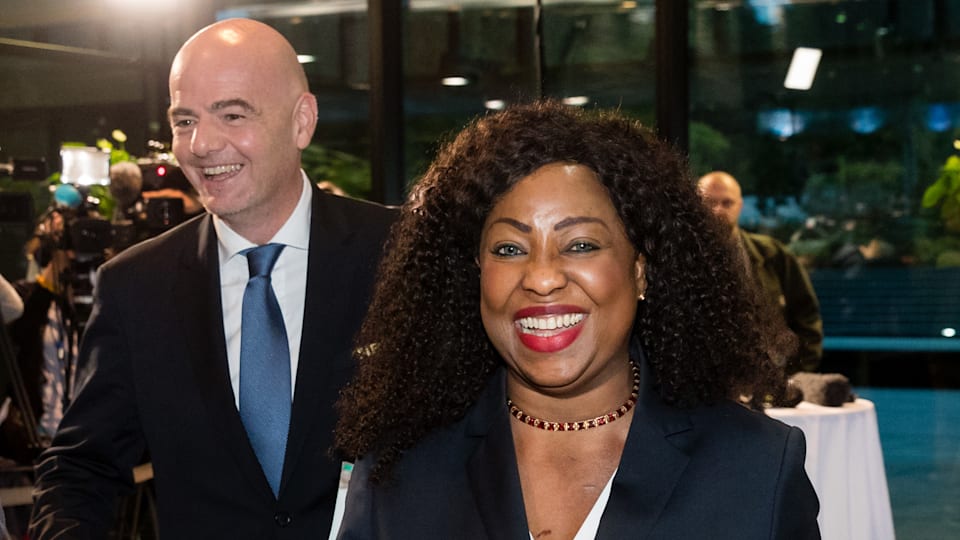
As Secretary General of FIFA, Fatma Samoura holds one of the most powerful positions in the whole sporting landscape.
Her appointment in May 2016 surprised many in the game.
“It was the first time in the history of FIFA that a woman, from Africa, who is Muslim, and not part of football (was appointed in a senior role),” she said to the Olympic Channel Podcast.
Before FIFA, Samoura worked for the United Nations for 21 years.
She’s bringing her experience from war zones and conflict to football’s governing body.
It’s her hope to bring gender equality to the very top of the priority list.
We are 50 percent of the world population and it's just normal that (our) voice is not overlooked
On the eve of the Women’s World Cup in France, the Olympic Channel Podcast were invited to speak to Fatma.
We are aiming at having 1 billion viewers - Fatma Samoura on FIFA's target for WWC
Excitement for the World Cup
Interest in the women’s game is on the rise.
Huge stadiums are selling out and big-name sponsors are being secured.
FIFA have big ambitions for the Women’s World Cup.
“We are aiming at having one billion viewers. So, 25 percent more than what we experienced in Canada (for the Women’s World Cup four years ago," said Samoura.
“We also hope that it will be a strong signal for the commercial partners to start now considering the Women's World Cup as a stand-alone product.”
At the moment, the tournament part of the bundle to rightsholders of the men’s World Cup.
“We have more and more women showing interest in football. (Either) as players, as coaches, or as referees.
“But also, as simple fun or as the mother of the girls who are playing.
“I'm sure it will be a fantastic World Cup.”
The most powerful woman in football?
The unexpected move by FIFA President Gianni Infantino to bring in someone outside of football to be one of its top administrators raised eyebrows.
“These three years have been a very exciting journey for me but sometime very bumpy because my appointment arrived at the moment where FIFA was criticised worldwide because of all those scandals and corruption cases.”
The FIFA president has now declared that crisis over.
“The last three years and four months have certainly not been perfect,” said Infantino at the FIFA Congress in Paris ahead of the Women’s World Cup.
“Nobody talks about rebuilding FIFA from scratch. Nobody talks about scandals. Nobody talks about corruption.”
Samoura is proud of where the organisation is now.
“We were able… to transform the company that was considered as a toxic brand (into a) very proud company with football being taken back into centre stage.”
Focus on Africa
Within the women’s game there remains a lot of work to be done – especially in Samoura’s home continent of Africa.
“Let's say that women's football in Africa is growing steadily. We cannot compare it to what's happening in Europe because we don't have the same level of involvement of women.
“African women’s football is still facing a lot of stereotypes and a prejudice.
“Now, (it’s) not part of the culture in many countries; including in my own (country of Senegal) where women playing football is considered as something that is not tolerated.
“But from the last two Africa Cup of Nations, we could see that it's growing in momentum.”
Equality and Money
Despite the strides made, almost every continent is facing its own difficulties.
In the Americas, the U.S. team have an open legal battle with the federation for gender discrimination and Colombia says they were treated as ‘second-class citizens’ by their national federation.
Over in Europe, Norway will go to the World Cup without Ballon d’Or winner Ada Hegerberg after she criticised her federation for not being good enough.
“The national team doesn’t define me as a person,” she said to the Olympic Channel Podcast.
“I’m still a proud Norwegian. I love my country. I miss representing my country and that explains the whole situation.”
FIFA’s Chief Women’s Football Officer, Sarai Bareman, is sympathetic to women who are fighting for gender equality within the game.
“I would never go against (Ada Hegerberg),” Bareman said to the Olympic Channel Podcast.
“I imagine that must have been a really tough decision for her to take. The Women's World Cup is the biggest female sporting event in the world.
“It's the pinnacle of the women's game so to be an athlete at her level and to make that decision - I think it must have been a really tough one for her.
“This is a personal choice that she's made and she's standing up for and that's a really admirable thing.”
Work to do be done
For Fatma Samoura, the groundwork transforming football’s attitudes comes from changing the make up of the committees that run the game.
“We are doing more and more in having woman sitting on the highest board of FIFA.
“Today, there are 43 percent women to men (present) in the FIFA administration.
“We consider that we have also make substantive effort to increase the number of women represented in the committees.
“And I can see cite tens of examples of how my U.N. experience helped us to shape the way for more women to join a world that was, let's say, a male-dominated industry.”
Fatma Samoura and Sarai Bareman are the guests on this week's Olympic Channel Podcast.
Each week we find the biggest athletes and speakers to talk about the Olympics.
